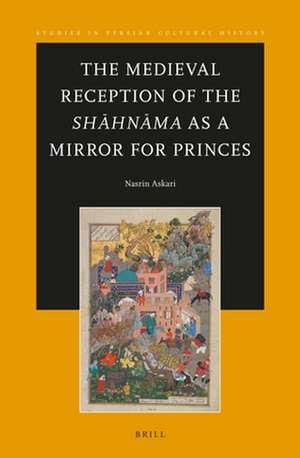The Medieval Reception of the Shāhnāma as a Mirror for Princes: Studies in Persian Cultural History, cartea 9
Autor Nasrin Askarien Limba Engleză Hardback – 24 aug 2016
Preț: 767.05 lei
Preț vechi: 935.42 lei
-18% Nou
Puncte Express: 1151
Preț estimativ în valută:
146.78€ • 156.95$ • 122.38£
146.78€ • 156.95$ • 122.38£
Carte indisponibilă temporar
Doresc să fiu notificat când acest titlu va fi disponibil:
Se trimite...
Preluare comenzi: 021 569.72.76
Specificații
ISBN-13: 9789004307902
ISBN-10: 9004307907
Dimensiuni: 155 x 235 mm
Greutate: 0.66 kg
Editura: Brill
Colecția Brill
Seria Studies in Persian Cultural History
ISBN-10: 9004307907
Dimensiuni: 155 x 235 mm
Greutate: 0.66 kg
Editura: Brill
Colecția Brill
Seria Studies in Persian Cultural History
Cuprins
Table of Contents
Note on Transliteration, Translation, and Style
List of Appendices
Acknowledgements
Introduction
Chapter 1
The Medieval Reception of Firdausī’s Shāhnāma
The Reception of the Shāhnāma on the Part of Sultan Maḥmūd
The Shāhnāma and the ‘Abd al-Razzāqiyān Family
The Reception of the Shāhnāma on the Part of Medieval Writers
Chapter 2
The Portrayal of Ardashīr in the Shāhnāma
Part I – Ardashīr’s Eligibility for Kingship
Part II – Ardashīr’s Successful Kingship
Chapter 3
The Wisdom of Ardashīr and His Advices in the Shāhnāma
Ardashīr’s Customs and Practices (āyīn)
Ardashīr’s Throne Speech (andarz)
Ardashīr’s Testament (‘ahd)
Chapter 4
The Ardashīr Cycle and Medieval Persian Mirrors for Princes
The Pandnāma of Sebüktegin
The Ādāb-i salṭanat va vizārat
The Qābūs-nāma
The Siyar al-mulūk of Niẓām al-Mulk
The Naṣīḥat al-mulūk of Ghazālī
The Aghrāż al-siyāsa fī a‘rāż al-riyāsa
Two Chapters of the Jāmi‘ al-‘ulūm (Sittīnī)
The Marzbān-nāma
The Ᾱdāb al-ḥarb va al-shujā‘a
Conclusion
Bibliography
Note on Transliteration, Translation, and Style
List of Appendices
Acknowledgements
Introduction
Chapter 1
The Medieval Reception of Firdausī’s Shāhnāma
The Reception of the Shāhnāma on the Part of Sultan Maḥmūd
The Shāhnāma and the ‘Abd al-Razzāqiyān Family
The Reception of the Shāhnāma on the Part of Medieval Writers
Chapter 2
The Portrayal of Ardashīr in the Shāhnāma
Part I – Ardashīr’s Eligibility for Kingship
Part II – Ardashīr’s Successful Kingship
Chapter 3
The Wisdom of Ardashīr and His Advices in the Shāhnāma
Ardashīr’s Customs and Practices (āyīn)
Ardashīr’s Throne Speech (andarz)
Ardashīr’s Testament (‘ahd)
Chapter 4
The Ardashīr Cycle and Medieval Persian Mirrors for Princes
The Pandnāma of Sebüktegin
The Ādāb-i salṭanat va vizārat
The Qābūs-nāma
The Siyar al-mulūk of Niẓām al-Mulk
The Naṣīḥat al-mulūk of Ghazālī
The Aghrāż al-siyāsa fī a‘rāż al-riyāsa
Two Chapters of the Jāmi‘ al-‘ulūm (Sittīnī)
The Marzbān-nāma
The Ᾱdāb al-ḥarb va al-shujā‘a
Conclusion
Bibliography
Notă biografică
Nasrin Askari, PhD, (2012), University of Toronto, has completed a Postdoctoral Fellowship at the University of British Columbia, and is currently a Bahari Visiting Scholar in the Persian Arts of the Book at the Bodleian Library, University of Oxford.
Recenzii
Winner of the 2018 World Award for Book of the Year of the Islamic Republic of Iran in the field of Islamic/ Iranian Studies.
“Askari has produced a highly valuable contribution to studies not only of the Shāhnāma but also of the long tradition of Persian moralia. [...] In this fine study, Askari furthers our awareness of the broad dissemination in the Persian mirror literature of Sasanian political wisdom, and the spectrum of uses to which it was put.” - Louise Marlow, Wellesley College, in: Journal of the American Oriental Society 138/4 (2018)
"The author deserves the highest praise for achieving a precise and most creative work of research. She has admirably enhanced the study of Persian literature." - Olga Davidson, Boston University, in: Bulletin.Critique Annales Islamologiques 32 (2018)
“…Askari’s book is a very valuable contribution to the scholarly literature on the Persianate political ethic.” Saïd Amir Arjomand, in, Journal of Persianate Studies 12
“Askari has produced a highly valuable contribution to studies not only of the Shāhnāma but also of the long tradition of Persian moralia. [...] In this fine study, Askari furthers our awareness of the broad dissemination in the Persian mirror literature of Sasanian political wisdom, and the spectrum of uses to which it was put.” - Louise Marlow, Wellesley College, in: Journal of the American Oriental Society 138/4 (2018)
"The author deserves the highest praise for achieving a precise and most creative work of research. She has admirably enhanced the study of Persian literature." - Olga Davidson, Boston University, in: Bulletin.Critique Annales Islamologiques 32 (2018)
“…Askari’s book is a very valuable contribution to the scholarly literature on the Persianate political ethic.” Saïd Amir Arjomand, in, Journal of Persianate Studies 12












